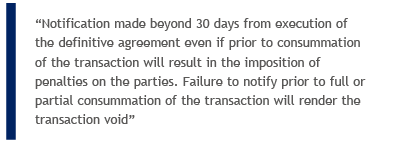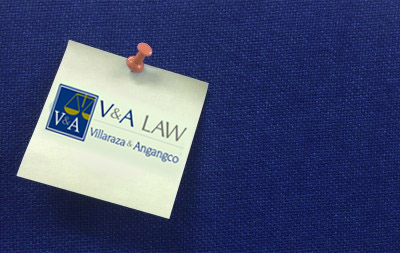By Franchette M Acosta, senior partner, V&A Law
The Philippine Competition Commission (Commission or the PCC) issued the Rules on Merger Procedure which explain the timing for the filing of a notice for covered transactions, the procedure for notification, Phase 1 and Phase 2 review and other matters, including confidentiality claims. These matters are summarised briefly below.
Timing for notification under the PCC rules on merger procedure
The Rules on Merger Procedure issued by the Philippine Competition Commission took effect on December 8, 2017, after the required publication. Significantly, the Rules revise the prescribed timing for the filing of the required transaction notice under the Philippine Competition Act. Under the law, mergers, acquisitions and joint ventures satisfying transaction thresholds must be notified prior to consummation. Relevant thresholds include the assets and revenues of the ultimate parent entity of the acquiring or acquired entity, the value of the transaction and percentage of the corporation acquired. The Rules require notification within 30 days from execution of the definitive agreement. Under regulations in place prior to the effectivity of the Rules, notification had to be given prior to the execution of the definitive agreements of the transaction.
Definitive agreements are defined by the Commission as those setting out the complete and final terms and conditions of the transaction, including rights and obligations between or among the transacting parties. Share Purchase Agreements, Asset Purchase Agreements, Joint Venture Agreements or other similar agreements are considered definitive agreements. Notification made beyond 30 days from execution of the definitive agreement even if prior to consummation of the transaction will result in the imposition of penalties on the parties. Failure to notify prior to full or partial consummation of the transaction will render the transaction void, and will also subject the parties to fines. A merger or acquisition is consummated where the parties have performed their obligations under the definitive agreement resulting in the transfer, conveyance, assignment or encumbrance of any right, title, interest, property or asset.
M&A review under the Rules follows a two-phase process. Phase 1 review is conducted within a period of 30 days from complete notification and payment of filing fees. However, prior to the commencement of this period, the Commission is given an opportunity to review the submissions to determine completeness. Thus, within a period of 15 days from receiving the parties’ submission, the Commission will conduct a sufficiency check to verify if the parties have provided complete information and documentation. If the submission is complete, the parties will be directed to pay the filing fee. If the submission is determined to be incomplete, the period to conduct the sufficiency check will be effectively extended. The parties will be informed and will have 15 days to respond and provide the needed information. In the meantime, the 15-day Sufficiency Period is suspended.
The purpose of the Phase 1 review is to establish whether the notified transaction is likely to give rise to competition concerns, which must be subjected to further study. The Commission will clear the transaction for consummation if it determines that the transaction does not raise competition concerns. However, if the Commission is not convinced that the transaction does not raise competition concerns, review will proceed to Phase 2. For this purpose, the Commission will serve notice on the parties and request for additional information.
Phase 2 runs for a period of 60 days commencing on the day after service of Phase 2 notice. The transaction parties must respond to a Phase 2 request for information within 15 days from receipt. Failure to respond within the period shall result in the expiration of the parties’ notice, and the parties will have to re-file. However, if the Commission is in possession of alternative relevant information, it may decide to pursue Phase 2 review.
 In the course of Phase 2 review, the Commission will evaluate whether the notified transaction will substantially prevent, restrict or lessen competition (SLC) in the relevant market. If it is concluded that the notified transaction is likely to result in SLC, the Commission will prohibit the transaction or impose conditions to address the anti-competitive effects such as requiring the parties to enter into agreements or dispose assets or shares in order to prevent anti-competitive effects. In the course of Phase 1 and Phase 2 Reviews, the transaction parties may volunteer commitments to remedy, mitigate or prevent competition concerns identified by the Commission. However, proposals for commitments will not be allowed after the PCC has rendered a decision.
In the course of Phase 2 review, the Commission will evaluate whether the notified transaction will substantially prevent, restrict or lessen competition (SLC) in the relevant market. If it is concluded that the notified transaction is likely to result in SLC, the Commission will prohibit the transaction or impose conditions to address the anti-competitive effects such as requiring the parties to enter into agreements or dispose assets or shares in order to prevent anti-competitive effects. In the course of Phase 1 and Phase 2 Reviews, the transaction parties may volunteer commitments to remedy, mitigate or prevent competition concerns identified by the Commission. However, proposals for commitments will not be allowed after the PCC has rendered a decision.
The Mergers and Acquisitions Office (MAO) will issue a Statement of Concerns (SOC) if based on evaluation, it determines that the transaction is likely to give rise to SLC. The SOC, which must set forth the findings of the MAO, is filed with the Commission not later than the 45th day of the Phase 2 period. Following receipt of the SOC, the transaction parties have the opportunity to present their defence. The parties may request for a state of play meeting, or file a verified comment within a period of 10 days. To better prepare their defence, the transaction parties may request the PCC to disclose the documents on the basis of which the SOC was issued. Following the submission of the verified comment, the parties may request for a conference or the PCC may require the parties to submit further briefs, memoranda or other information. The PCC shall promulgate its decision within 15 days from the date of the last hearing or submission of the parties.
Confidentiality claims under the rules
Under the Rules, all information provided during the course of a pre-notification consultation (PNC) shall be treated as confidential by the PCC. Parties cannot claim confidentiality as an excuse for not submitting any document or information required by the PCC. Confidentiality of documents submitted pursuant to a notification are expressly governed by Section 9 of the Rules. The PCC is allowed to disclose Confidential Information only when there is consent from the person or entity claiming confidentiality or when disclosure is required by law, by a valid order of a court or by virtue of an agreement with a government agency. Another instance when disclosure can be made is when it is necessary to enforce the law. This last instance gives the PCC broad discretion. The condition for disclosure to government agencies outside the Philippines is stricter, as it requires the waiver of the entity claiming confidentiality.
Generally, the Rules extend confidential treatment to Confidential Business Information, which is defined as information which “concerns or relates to the operations, production, sales, shipments, purchases, transfers, identification of customers, inventories, or amount or source of any income, profits, losses, expenditures which are not generally known to the public or to other persons who can obtain economic value from its disclosure or use, or is liable to cause serious harm to the person who provided it, or from whom it originates, and is the subject of efforts that are reasonable under the circumstances to maintain its secrecy.” However, the PCC may also extend confidentiality to information other than Confidential Business Information upon claim of an entity on the ground that the information is not generally known to the public or if the disclosure of information is prejudicial to any investigation conducted under the law. The following information are not considered confidential by the PCC: the fact of a merger/acquisition, information that will not cause harm to the business if disclosed to the public, information that reflects the parties’ view of how the competitive effects of the merger could be analysed, and information that is general knowledge within the industry or may be verified by any diligent market participant or expert.
It should be noted that submissions to the PCC should indicate if there are any claims of confidentiality, which must be particularly or specifically substantiated. General claims of confidentiality will not be given due course. Unless there is a claim of confidentiality, the PCC will presume that none of the information contained in a party’s submission is confidential. The parties claiming confidentiality must provide a non-confidential version of the submission. The MAO will provisionally extend confidential treatment if the request for confidentiality meets the conditions required under the Rules. If the MAO does not agree that information provided should be treated confidentially, the MAO must notify the parties at least five days prior to disclosure. The affected parties may question this decision within a period of five days by raising the issue with the Commission. The MAO shall not make any disclosure during that period.
This article is published for information purposes only, and should not be considered legal advice.



























 Villaraza & Angangco Law
Villaraza & Angangco Law Kristin Charisse C. Siao
Kristin Charisse C. Siao Ma. Carla P. Mapalo
Ma. Carla P. Mapalo Richard Henrick I. Beltran
Richard Henrick I. Beltran







